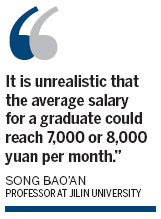|
College seniors look for employment opportunities on Thursday at the first job fair in Beijing for students who will graduate next year. [Photo/China Daily] |

More than half of college students who will graduate next year are willing to accept a monthly salary of less than 4,000 yuan ($638), according to a survey released on Saturday.
The survey, conducted by renren.com, a popular social networking website which launched its job-search service for graduates in July, ran from Aug 21 to Sept 16.
It received more than 150,000 replies and had a valid sample of 94,739 college students who were expected to graduate next year, said Wang Xiehua, an officer from renren.com, on Monday.
Those surveyed came from 31 provinces, municipalities and autonomous regions across the mainland, including undergraduate students, master students and PhD students, the report said.
More than 80 percent of surveyed students expected a salary in their first job of less than 6,000 yuan per month. About 54 percent of respondents would accept a monthly salary of between 2,000 yuan to 4,000 yuan, and about 21 percent would accept a salary below 2,000 yuan.
For most of the undergraduate or junior college students, the expected salary was between 2,000 yuan to 4,000 yuan per month. For masters students, 32.3 percent expected their monthly salary to reach 4,000 yuan to 6,000 yuan after graduation and 20.6 percent expected a salary of between 6,000 yuan to 8,000 yuan.
The expected salary for most PhD students was above 10,000 yuan.
"The expectation of a monthly salary of less than 4,000 yuan was objective. Actually the salary is higher than the average level of income in China," said Song Bao'an, a professor at the Department of Labor and Social Security at Jilin University, on Monday.
"The graduates should not have an unrealistic expectation for their salaries. It is unrealistic that the average salary for a graduate could reach 7,000 or 8,000 yuan per month," he said.
According to research released by Zhejiang Foreign Service Corp on Sept 23, the average starting salary for a graduate in 2011 was 3,051 yuan.
The figure is similar to the average starting salary for a graduate returning from an overseas university, which was 3,000 yuan. According to the same report by Zhejiang Foreign Service Corp, the starting salary for 71 percent of surveyed graduates from overseas was 3,000 to 10,000 yuan.
In 2012, the average starting salary for a graduate who worked for foreign enterprises in Shanghai was 3,745 yuan, an increase of 15.3 percent from 2011, according to a report by xinmin.cn.
The report released by renren.com also found that most of next year's graduates wish to work in their hometowns. It shows that 30.6 percent of respondents decided to work in their hometowns while 22.7 percent wanted to work in Beijing, Shanghai, Guangzhou and Shenzhen. Another 15.6 percent intended to work in a wealthy coastal area or in a second-tier city.
In terms of employer type, 23.2 percent of respondents want to work in State-owned enterprises and those hoping to be employed by public institutions accounted for 21.8 percent.
Mao Zichen, 23, who majored in broadcasting and hosting at Liaoning Finance and Trade College, said that about 80 percent of the students in his major will choose a job that has nothing to do with their major.
"I'm learning accounting now because I hope I can enter a State-owned enterprise after graduation. Jobs at State-owned companies are usually stable with good salary. Also, it's easier than passing the public servant exam," said Mao, who is expected to graduate in 2013.
"For salary, 2,000 yuan per month is my bottom line. To find a job with a chance of promotion is more important than the salary," Mao said, who also hoped to work in Shenyang, his hometown in Liaoning province.
According to Song, the professor with Jilin University, many students chose to work in their hometown because most of them are the only child in their family.
"The group has a feeling of insecurity and they want support and help from families and relatives. An unstable life in an unfamiliar city could add to the feeling of insecurity," Song said.
Luo Wangshu in Beijing and Liu Ce in Shenyang contributed to this story.
jinhaixing@chinadaily.com.cn
